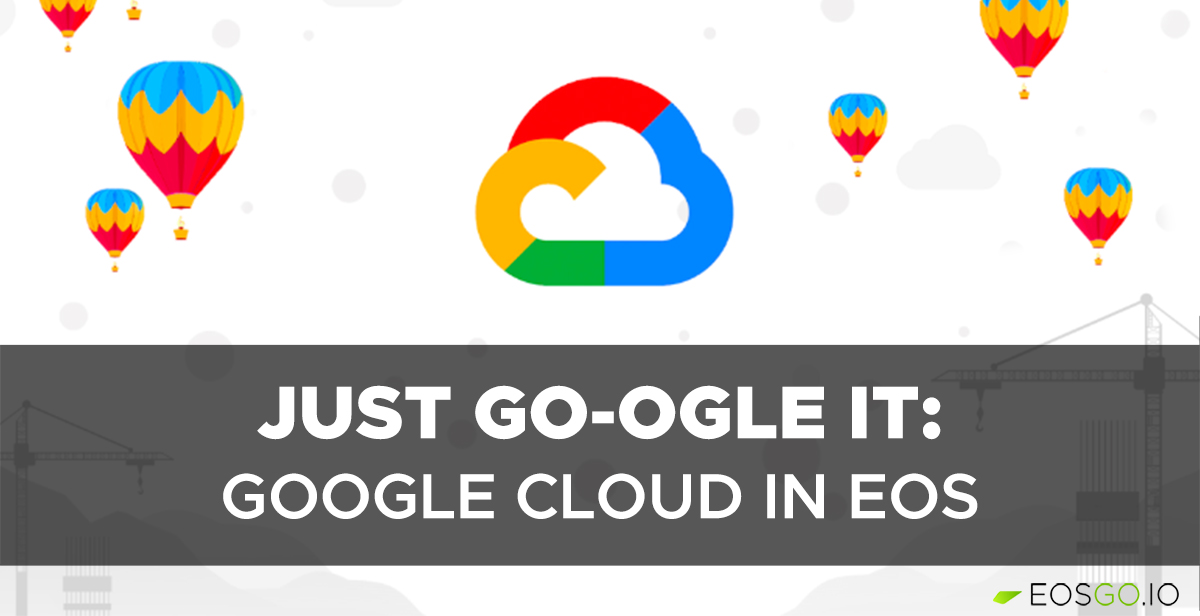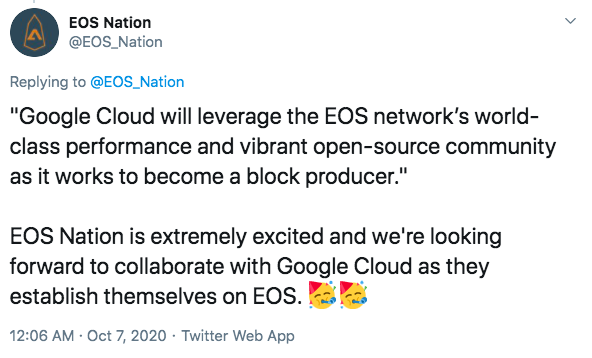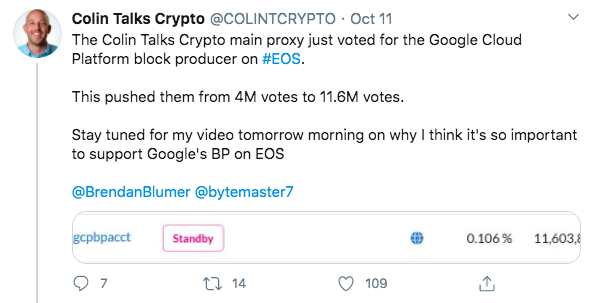Just Go-ogle It

As pretty much everyone in the EOS space and broader crypto space is now aware, Google Cloud has Joined EOS as a Block Producer. For the most part this has been taken by many as a very bullish sign of things to come for EOS, but opinions as they tend to do come in all forms of shapes and sizes with a variety of rationals behind them. In this piece then, EOS Go will review some of the sentiment in the EOS community and reasons to be both bullish and potentially even weary of what this shift in traditional block producer image means.
Block.one Welcomes Google Cloud
The most logical place to begin then would be with the official announcement of Block.one Welcoming Google Cloud to the EOS Community.
“Google Cloud will continue to provide its highly provisioned, low-latency infrastructure to Block.one… Through secure oracles, inter-chain transaction reporting, key management, and high-integrity full-node validation, Google Cloud’s confidential computing infrastructure will enhance the security, scalability, and decentralization of blockchain technology.” Dan Larimer, Block.one CTO.
“With the majority of global public blockchain activity, EOS is a powerful solution for anyone looking to leverage the decentralized ecosystem with ease... The Google Cloud team understands the thriving EOS community and the highly performant EOSIO technology on which it builds create the best entry point into the blockchain industry. We welcome Google Cloud to the EOS community and are excited for their contributions to the EOS network.” Brendan Blumer, Block.one CEO.
Of course it is no surprise to hear these words echoed from Block.one considering for quite some time now they have been seemingly focused on building out and launching a “new suite of enterprise service offerings designed to help organizations integrate blockchain-based solutions into their operations” utilizing EOSIO technology for Business grade use cases and applications (Block.one Introduces EOSIO for Business). Quite simply stated all personalized feelings one may have towards Google aside, Google being a true OG of the digital space and the respect that brings with it becoming block producer on the EOS network will go a long way in bringing on board other mainstream companies even if only at the very least to build upon and utilized the network.
Google Cloud Voting and Node Revenue Distribution
As noted by CoinDesk, Google Cloud Does Not Intend to Take EOS Rewards as a Block Producer and more of an infrastructure as opposed to mining play.
“As more companies show interest in participating in this kind of technology, Google Cloud believes it can learn how to better support customers who wish to run validation nodes on projects such as EOS.”
Although at this point it is unclear whether Google cloud “attain network tokens to stake in support of its own candidacy” or what exactly will happen to all those block rewards that they would potentially receive, it seems that this is something that both Google and Block One have a vested interest in seeing being grown and taken to the next level.
On the specific aspect of reward collection, although it is possible that these would just never be claimed, it seems strange that a multi billion dollar company would simply not be interested in the tokens even if the price remained on the lower end of things. That said as Corey from Chirp pointed out on a recent episode of Chirpcast, potentially it could even come down to ‘Google being in a position where they still think there is some potential legal liability being a much fatter target than even EOS with millions slashing around in their coffers’ (source). Of course for now, all of this is just mere speculation and until more information is officially released or something visible appears on-chain solidifying this or any other theory that may be out there we may never know.
As for making the move into the top 21, in the end it will come down to getting the votes to do so. The EOS space has had some issues with governance and the problematic image of block producers only voting for ‘friends’ to collude towards keeping the top 21 in perpetual power, so if this is the case would they really want to risk voting Google into the mix? On the flip side it stands to reason that the more traction EOS gets in the mainstream with on-boarding the more likely that the financial benefits to being a part of the network will increase, so it might be the case whereby no matter the stance on governance the majority of proxies will be dropping Google Cloud into their list.
Thus far at least both the number one block producer and the largest community proxy seem to be onboard with getting all the collective benefits that Google may bring to the space to fruition.

https://twitter.com/EOS_Nation/status/1313495872932642820

https://twitter.com/COLINTCRYPTO/status/1314987028552056835
For those interested the complete video can be found here.
EOS Governance Issues Questioned Again
That is not to say that there might not be some reservations however, and of course some mixed feelings as well. And although EOS Go may not entirely agree with these, it seems fair to try to present the reaction to this announcement in the most unbias way possible.
Hashoshi in his weekly Crypto Over Coffee video review tackles the issue in his 404 Logic Not Found segment pointing out that having admitted that the governance in EOS has issues why would Block.one be excited that Google Cloud, a known centralized conglomerate, be becoming part of their centralized network? Going on to state the multiple advantages that Google Cloud has in network metrics arguing that small time block producing candidates which are constantly scrounging for manpower and resources cannot possibly compete when it comes to garnering votes from the public. In other words in Hashoshi’s opinion, even though “EOS was built to be a decentralized network, but the mechanics of the network itself are incenting centralization to happen… and here EOS is celebrating Google Cloud becoming a block producer.” Now before you write this off as complete FUD, he does go on to note that “EOS has so much going on under the hood, but [the governance is a broken sad affair that needs to be fixed and genuinely the strategy is not understood]” (Video Source).
Naomi Brockwell, another well known entity in the blockchain and cryptocurrency space covered the news directly in Google Cloud an EOS Block Producer? Dan Larimer Responds. In conversation with Dan Larimer they highlight the fact that having Google Cloud as a block producer is very exciting in itself but it also brings up the point about EOS having a lot of information on-chain and how partners like this can be very beneficial. In What is EOS? Naomi and Edge CEO Paul Puey go on to note that even though the possible addition of Google Cloud to the official block producer status helps break apart the impression that EOS is controlled by the Chinese, but if many other players decided to get involved on the back of this is do we really want 21 major corporations being block producers of a major blockchain, and even if that is something we don’t mind, is that not a big target for major governments when it comes to targeting certain types of informational reserves.
Most people are still expecting Google Cloud to enter EOS
Ricardo Schiller, lead architect of BlockBase which is likely the closest thing to operational cloud storage on EOS at present had this to say.
“Having Google Cloud as a block producer on the EOS network is a huge milestone for block.one and the community. It never ceases to amaze me how complex and revolutionary EOSIO tech is. Nonetheless a blockchain network needs much more than that to succeed. Looking back, it’s hard for me to imagine a company with so much capital and talent being able to alienate their community, so I truly hope this great milestone is just one of many from a fresh holistic approach to building the future of EOS.”
And with all that has been going on with block.one and EOS since its inception it is easy to see how some feel that more could and should be done. Although it is unlikely it is potentially possible that the top 21 could be taken over by multibillion dollar corporations and collude to do with EOS whatever they wanted. In fact as Paul Puey pointed out in the video above, one of the block producers first actions after the launch of the mainnet was to freeze some questionable accounts in the name of righting the wrong of a previous hack. Recall if you will the naccient outcry when CZ of Binance merely mentioned doing a similar thing in rolling back the blocks to reverse a hack and it is clear to see that power wielded in the wrong hands in EOS could quickly lead down a path of no repair.
Of course all this is incredibly unlikely, but if block.one and other major stakeholders of EOS do decide to side with corporations instead of what the community wants then all will be for not in terms of maintaining a true decentralized community run network. And yes, there is always the option of countless other EOSIO chains, many of which are already doing amazing things in their own right, but the damage will by that point already be done and many will more than likely not be willing to compromise but instead potentially abandon the EOSIO ship altogether.
All that aside, none can predict the future of what is to come but just the mere fact that Google Cloud would be interested enough in the technology to want to spin up a node, go through the process of PR to get the votes to get into the top 21, and all under the clear notations that they are doing it for the tech and not the money in the end make a pretty bullish case for the future of EOS.
As Joseph from EOS Asia and Polar.io notes
“when you reflect on the world’s most famous and powerful companies you may have the following names popping out of your mind: Google, Apple, Amazon, and so on… Well, at present, no other blockchain has ever seen a company as large as Google (despite it being Google Cloud) take a forefront position in one of these projects. I can admit without a doubt that this is the biggest news I've ever seen as a member of the crypto community. To people calling it another move towards further centralization for EOS, I would reply that couldn't be further from the truth, as the decentralization of the platform will in fact remain unmatched and unchanged due to the set number of Block Producers that the Network supports (21). Conversely, EOS would receive support from one of the largest corporations in the world towards platform improvement that has ever been provided to any other blockchain. All this is nothing but exciting and potentially revolutionary.”
Conclusion.
Of course, while the community is divided, no one can predict the future or know what the Google Cloud will bring to the EOS ecosystem next.
Although there are some problems with EOS, the addition of Google Cloud has actually brought a lot of traffic and fame to EOS, and as one of the many believers in EOS, all we can do is to believe in EOS and look forward to more and more exciting performance of EOS.
This is the end of this article, stay tuned to EOS Go to keep up with more EOS information.